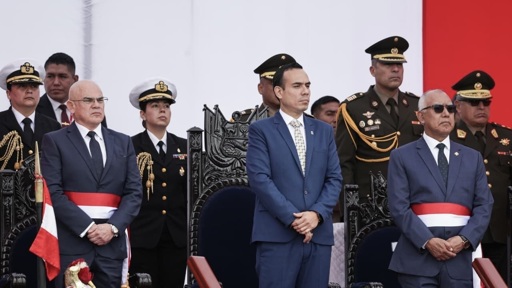On November 3, the recently formed government of José Jerí announced that it would sever diplomatic relations with Mexico, due to the Mexican executive’s alleged interference in Peru’s turbulent political situation. The previous president, Dina Boluarte, was deposed by Congress to make way for José Jerí’s administration, which, according to several analysts, will also have serious problems completing the presidential term that extends until 2026.
This crisis of legitimacy has been ongoing since Peruvian political elites removed the progressive president-elect, Pedro Castillo, from office at the end of 2022.
On November 3, on X, the Presidency of Peru wrote: “The Government of Peru has decided to break diplomatic relations with Mexico, due to the repeated occasions on which the Mexican government intervened in the internal affairs of our nation.”
The Peruvian government is referring specifically to Mexico’s announcement that it will grant asylum to former Peruvian Prime Minister Betssy Chávez, who was the last chief of staff of Pedro Castillo’s ousted government. Chávez is currently under the protection of Mexican authorities at the Mexican embassy in Lima, Peru’s capital.
This is not the first time that the governments of MORENA, Mexico’s ruling party, have highlighted their disagreement with the actions taken against Castillo and his supporters. At the time, former Mexican President Andrés Manuel López Obrador rejected Castillo’s removal from office, which led to the mutual withdrawal of ambassadors in early 2023, during the harsh repression undertaken by the Boluarte government in response to massive protests against the new government’s inauguration, which resulted in the deaths of more than 60 demonstrators.
At that time, Mexico granted political asylum to Castillo’s wife, Lilia Paredes, and their children, who were being pursued by the Peruvian authorities to arrest and prosecute them for their alleged involvement in a money laundering network, something that has been rejected by Castillo and his family, who have diagnosed it as an unfounded justification for persecuting them.
In response to the Peruvian government’s decision to sever diplomatic relations, Mexican President Claudia Sheinbaum, also a member of MORENA, reiterated Mexico’s right to grant asylum to Chávez under international law and lamented Lima’s decision, which she described as unbalanced: “From our perspective, it is completely disproportionate, but it is a decision that they have made.”
For his part, Roberto Nolasco, undersecretary of the Mexican Foreign Ministry, reaffirmed Mexico’s historic tradition of granting diplomatic and political asylum to people who are considered politically persecuted, as was historically the case with Spanish refugees during the 1930s or political asylum seekers during the South American military dictatorships, to give a couple of examples.
Peru’s response
For his part, the President of Peru, José Jerí, wrote on X: “Respect our homeland! Due to the breakdown in diplomatic relations, the head of the Mexican embassy in Peru, Karla Ornela, was informed today by the foreign minister that she has a strict deadline to leave our country.”
Read More: Peru’s Congress ousts de facto president Dina Boluarte amid mass protests
According to Peruvian media outlet El Comercio, the Peruvian Foreign Ministry is still evaluating whether to allow Chávez to leave its territory for Mexico: “Foreign Minister Hugo de Zela confirms that Peru is evaluating whether or not to grant safe passage to Betssy Chávez, as requested by Mexico.” On Canal N, he said that a decision would be made “in a few days”. “International obligations and how they apply to Chávez’s case will be evaluated.”
Thus, the tense, albeit recent, history of diplomatic relations between Peru and Mexico continues. MORENA governments have been open to supporting progressive Latin American leaders who, they claim, suffer from lawfare, that is, the use of criminal charges to persecute people for their political positions and actions in government office.
At the time, Mexico granted political asylum to former Ecuadorian Vice President Jorge Glas at its embassy in Quito, but after a raid by Ecuadorian police forces (which Mexico claims violated international law), Glass was imprisoned in a maximum-security prison and was unable to travel to Mexico, as requested by the Mexican authorities.
The post Peru breaks diplomatic relations with Mexico appeared first on Peoples Dispatch.
From Peoples Dispatch via this RSS feed


